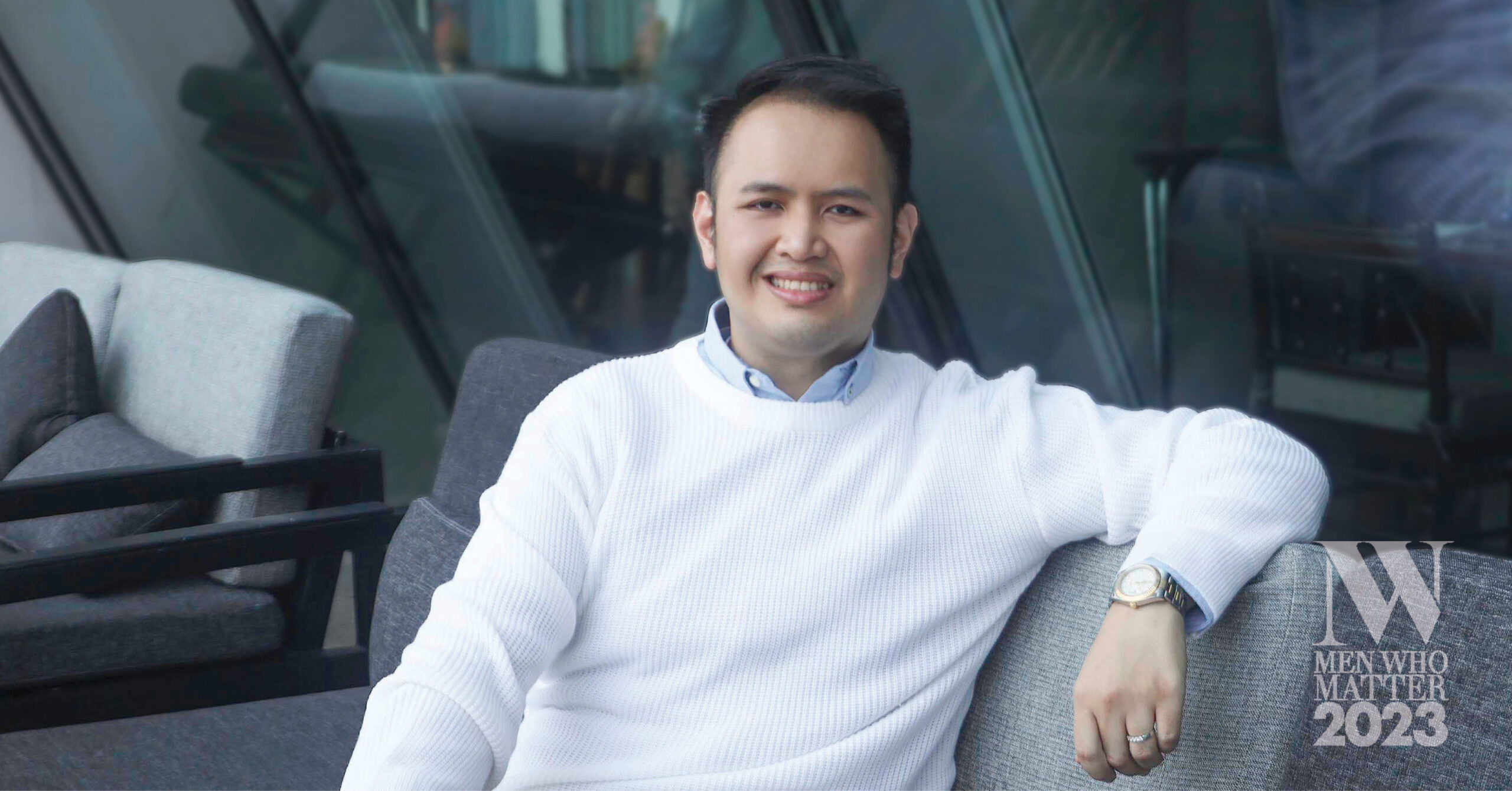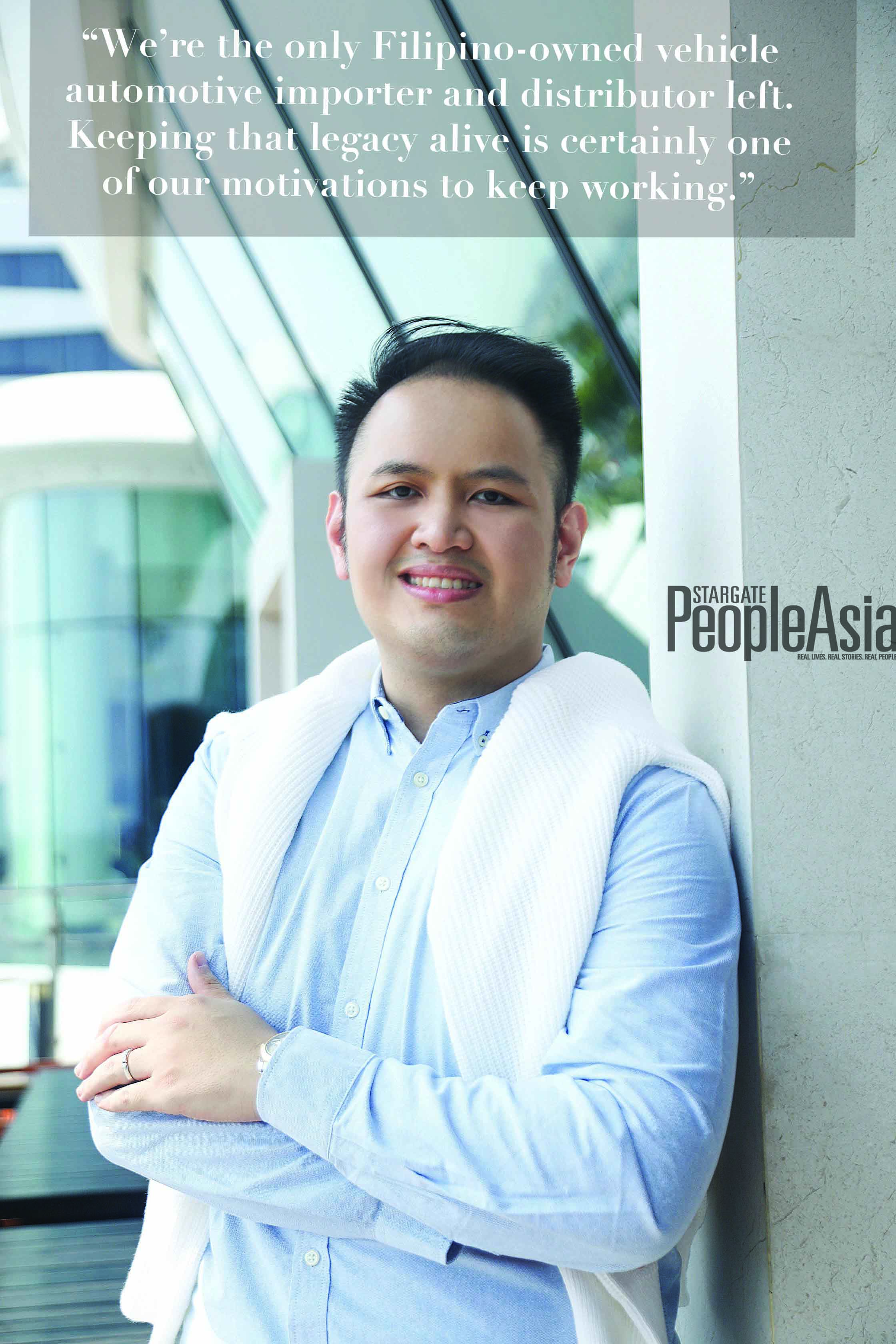Much like the iconic Swedish car brand that his family introduced to the Philippines in the mid ’90s, fourth generation businessman and executive Chris Yu embodies quiet confidence; secure in the fact that the quality of vehicles they carry, as well as the services they offer, speak for themselves — no need for bells and whistles.
By JOYCE REYES-AGUILA
Photography by RXANDY CAPINPIN
Volvo Philippines’ executive marketing director Christopher David Lee Yu says that Volvo vehicles are not “the flashiest cars but they will always work.” Volvos will always bring you to your destination safely. It’s just not in the DNA of the brand to be ostentatious.
“What Volvo provides is a safe, luxurious, reliable, dependable car. Stylish, yes, but not in the sense that it grabs your attention. It’s the kind of car that is very pleasant to look at every day. Volvos, if you notice, are never that bold but they do not go out of style that quickly, because the lines are very classic and the technology is also dependable.”
While such a statement could be mistaken for an elevator pitch, the tall and affable gentleman delivers it with somewhat understated yet palpable passion. A trip down memory lane reveals why.
Chris discovered his love for the automobile industry during the summers of his youth, which he spent at their family-owned Nissan showroom in Makati. His grandfather, David Yu, would bring him to work. Chris lived with his grandparents then, and the elder Yu made his grandson tag along frequently during summer vacations.
To this day, he believes there was no intent to push him toward the industry or, more correctly,
the family business. But life had a way of steering him towards the right direction. “I really feel that God made it happen for me to like the business,” he tells PeopleAsia. “And it was an opportunity that opened for me. I’m in the fourth generation already, but very few family members have expressed any interest in joining and getting a leadership position in the group. It works well for me because I enjoy cars, and, yes, I enjoy being part of the family business.”
The Yu family, as Chris’ grandfather told him early on, ventured into the automotive industry in 1954, when they established the first factory in Southeast Asia to assemble Mercedes-Benz vehicles. They transitioned into Datsun in the 1970s, then Nissan — a brand they had until 2010. Chris says the Yus still maintain a share in the firm, even after the Japanese invested locally. The family then introduced Volvo in 1994, Chevrolet in 2009 and MG in 2018.
When Volvo entered the market, Chris constantly accompanied his aunt, Selene Yu, then president of Volvo in the Philippines. Selene is now executive director of The Covenant Car Company, Inc. (TCCCI), the exclusive distributor in the Philippines of Chevrolet and MG, where Chris also serves as sales director.
Keeping the legacy alive
“Part of the motivation is not wanting to see generations of work end because no one wants to continue the business,” he shares. “It’s a very competitive industry. Selling is different in automotive because you deal with a lot of X factors and also a lot of competition. Your competition is not domestic. You’re dealing with international companies coming in. Sometimes the manufacturers themselves come in and compete with you. It’s a bit difficult to be in this industry, but because I enjoy it, I also find it very rewarding.”
Chris started as a dealer officer who supervised the outlets of Chevrolet. He admits that this role “pushed (him) to understand other people and their perspectives.” Chris adds, “I come from a fairly closed environment. I went to school in Xavier; I went to college in Ateneo — very Jesuit. And I went there also for my MBA. So, that kind of made my world ‘not as broad’ in terms of perspective.” The young executive reveals that he learned a lot as he worked with people from different backgrounds and with different views.
As a leader, he had to learn the ropes of talent management, acknowledging that people are a company’s most valuable but also most difficult asset to manage. “We all have our own motivations, our own inclinations. Learning to adapt and work with different personalities, characters and motivations — that’s something that I need to learn, because I continue to struggle with it.”
Chris advocates for a workplace where people feel cared for. “I remember my grandfather’s heart. He showed a genuine care for people. And that’s something that I hope I’m able to get from him. Even if you’re not the wealthiest company or give the highest compensation, when people know that the leaders care, they will work with you,” he explains. “Maybe there will come a point where, there are options outside, for the sake of their families they may transition to another company. But it’s never acrimonious. They come back and we still meet up. They mean more to me than the work because these are people you’re dealing with. And not to be religious, but God brought us here to work with people — not to enrich a company. We’re here to work together and be a positive influence for the people.”
Another takeaway that years of experience has given him: learning that he can’t always be right. “It was very liberating,” he reveals. “In business, there are many decisions you have to make and not all of them are aligned with everyone. Not everything you do will get everyone’s approval. As a leader, you do try to hear, and you try to understand perspectives. And often you learn something and pick up something. So that’s something that I grew into — part of the maturing process, I guess. But it’s also something that I have learned to embrace because it takes less pressure on you because you know that there are people with different perspectives but the same goal.”
Volvo Philippines
Chris, who also holds a senior leadership position in TCCCI, sees a promising future for the country’s automotive industry. “What excites me is how much value we continue to put in cars in the Philippines,” he states. “For most Filipinos, cars are their second biggest purchase after their home. The car is a symbol, an extension of the customer. What excites me is how the industry continues to evolve to bring in more brands, more competition. It’s more difficult but also more exciting. And also, more technologies that revolve around the client, the driver and around the people who are using the vehicles.
“Mobility should always be a priority. We’re poised to get 420,000 units this year. That really shows that there is a robust market for cars and that manufacturers have also turned their strategies into serving our market. But what excites me is getting more people into cars. Getting them from tricycles into safe vehicles — cars with global safety standards or even ASEAN safety standards. Getting people into more reliable modes of transportation — that for me is the key to really developing that industry in the Philippines and in many parts of the region as well. Thankfully, many brands have also gone in that direction to provide more affordable vehicles. Vehicles which are not boring.”
While electrification is the “buzzword in the industry,” Chris believes its wide adoption in the country will not happen in the next two years. “Electrification requires a lot of adjacent industries to contribute. But the one thing that we have not been able to do to promote electrification is that the government has not yet really given a strong reason for consumers to choose an electric vehicle over a traditional vehicle. We had hoped that with the EVIDA (Electric Vehicle Industry Development Act) Law that would change. But many of the fiscal incentives were removed in the final version of the bill. Although the law still promotes the use of electric vehicles (EVs), the monetary incentives to the consumer are not as attractive as we had hoped. Because of that, it might slow down the progress of that technology. But it is something that will happen. It might just take a bit longer than we had hoped.”
Full electrification
Volvo has pledged a full EV lineup by 2024 and “to have electrification in one form or another in all of our cars since last year,” according to the executive. Chris says they no longer have cars that are purely gasoline- or diesel-powered. “Everything we have has an electric motor. Some of them are mild hybrids, some are plug-in hybrids. We will be introducing pure EVs by the third quarter of this year. Those have been available in Europe since 2022, so whatever we’re introducing here has been tried and tested in developed markets already. So, that is exciting for Volvo.”
Chris says the EV market should differentiate its progress in the premium and mainstream markets. “In the premium market, all of these high-tech things are coming in. But they would not impact the broad majority of buyers until maybe 10 years from now.
“Because we are an automotive group, we handle anything from mid-to high-end vehicles. In the premium segment, these are very exciting, especially autonomous driving. That’s very exciting for me because it really takes a lot of the human intervention out. But in line with Volvo’s thrust, it’s also about safety technology because most traffic altercations happen because of human error.” The Swedish brand is known for its safety features. It openly shared its seatbelt invention in 1959 to all car manufacturers and did not patent it. Volvo also introduced the oxygen sensor in the tailpipe to minimize tail pipe emissions. Chris says the brand did not patent this innovation as well.
In the end, Volvo, according to Chris, is not about the bells and whistles that usually come with cars in the luxury segment. It’s about making things work, much like how this “Men Who Matter” thinks.
“We’re really in the business of building brands. We’ve been doing it for 70 years and we aim to continue doing that. We’re the only Filipino-owned vehicle automotive importer and distributor left. Keeping that legacy alive is certainly one of our motivations to keep working,” he concludes.
Art direction by DEXTER FRANCIS DE VERA
Styling by EDRICK PAZ
Grooming by KLENG TOTANES
Shot on location at CONRAD MANILA






